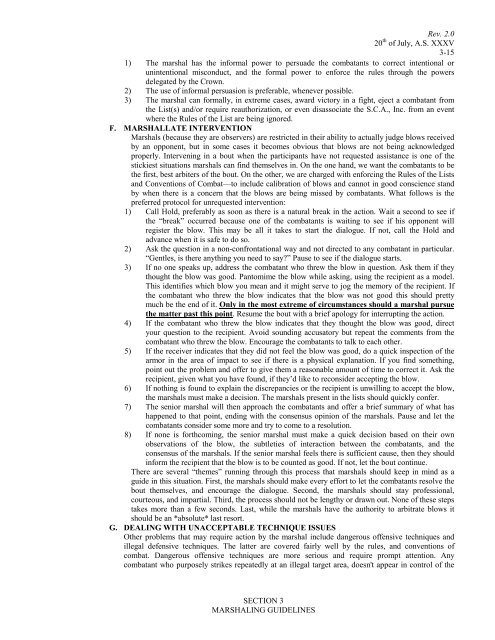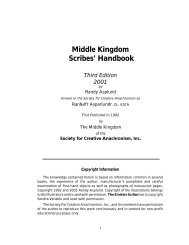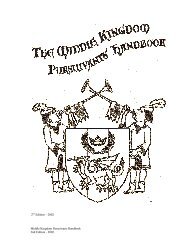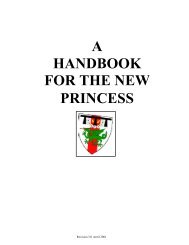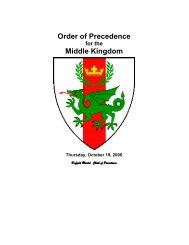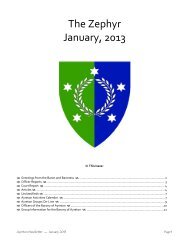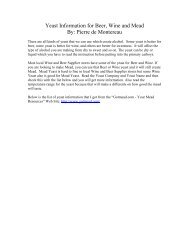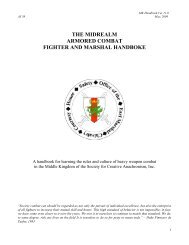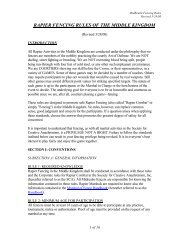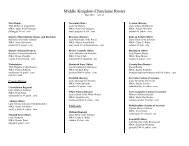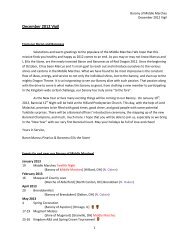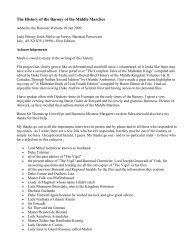Rapier Marshals Handbook - Midrealm / Middle Kingdom
Rapier Marshals Handbook - Midrealm / Middle Kingdom
Rapier Marshals Handbook - Midrealm / Middle Kingdom
You also want an ePaper? Increase the reach of your titles
YUMPU automatically turns print PDFs into web optimized ePapers that Google loves.
Rev. 2.0<br />
20 th of July, A.S. XXXV<br />
3-15<br />
1) The marshal has the informal power to persuade the combatants to correct intentional or<br />
unintentional misconduct, and the formal power to enforce the rules through the powers<br />
delegated by the Crown.<br />
2) The use of informal persuasion is preferable, whenever possible.<br />
3) The marshal can formally, in extreme cases, award victory in a fight, eject a combatant from<br />
the List(s) and/or require reauthorization, or even disassociate the S.C.A., Inc. from an event<br />
where the Rules of the List are being ignored.<br />
F. MARSHALLATE INTERVENTION<br />
<strong>Marshals</strong> (because they are observers) are restricted in their ability to actually judge blows received<br />
by an opponent, but in some cases it becomes obvious that blows are not being acknowledged<br />
properly. Intervening in a bout when the participants have not requested assistance is one of the<br />
stickiest situations marshals can find themselves in. On the one hand, we want the combatants to be<br />
the first, best arbiters of the bout. On the other, we are charged with enforcing the Rules of the Lists<br />
and Conventions of Combat—to include calibration of blows and cannot in good conscience stand<br />
by when there is a concern that the blows are being missed by combatants. What follows is the<br />
preferred protocol for unrequested intervention:<br />
1) Call Hold, preferably as soon as there is a natural break in the action. Wait a second to see if<br />
the “break” occurred because one of the combatants is waiting to see if his opponent will<br />
register the blow. This may be all it takes to start the dialogue. If not, call the Hold and<br />
advance when it is safe to do so.<br />
2) Ask the question in a non-confrontational way and not directed to any combatant in particular.<br />
“Gentles, is there anything you need to say?” Pause to see if the dialogue starts.<br />
3) If no one speaks up, address the combatant who threw the blow in question. Ask them if they<br />
thought the blow was good. Pantomime the blow while asking, using the recipient as a model.<br />
This identifies which blow you mean and it might serve to jog the memory of the recipient. If<br />
the combatant who threw the blow indicates that the blow was not good this should pretty<br />
much be the end of it. Only in the most extreme of circumstances should a marshal pursue<br />
the matter past this point. Resume the bout with a brief apology for interrupting the action.<br />
4) If the combatant who threw the blow indicates that they thought the blow was good, direct<br />
your question to the recipient. Avoid sounding accusatory but repeat the comments from the<br />
combatant who threw the blow. Encourage the combatants to talk to each other.<br />
5) If the receiver indicates that they did not feel the blow was good, do a quick inspection of the<br />
armor in the area of impact to see if there is a physical explanation. If you find something,<br />
point out the problem and offer to give them a reasonable amount of time to correct it. Ask the<br />
recipient, given what you have found, if they’d like to reconsider accepting the blow.<br />
6) If nothing is found to explain the discrepancies or the recipient is unwilling to accept the blow,<br />
the marshals must make a decision. The marshals present in the lists should quickly confer.<br />
7) The senior marshal will then approach the combatants and offer a brief summary of what has<br />
happened to that point, ending with the consensus opinion of the marshals. Pause and let the<br />
combatants consider some more and try to come to a resolution.<br />
8) If none is forthcoming, the senior marshal must make a quick decision based on their own<br />
observations of the blow, the subtleties of interaction between the combatants, and the<br />
consensus of the marshals. If the senior marshal feels there is sufficient cause, then they should<br />
inform the recipient that the blow is to be counted as good. If not, let the bout continue.<br />
There are several “themes” running through this process that marshals should keep in mind as a<br />
guide in this situation. First, the marshals should make every effort to let the combatants resolve the<br />
bout themselves, and encourage the dialogue. Second, the marshals should stay professional,<br />
courteous, and impartial. Third, the process should not be lengthy or drawn out. None of these steps<br />
takes more than a few seconds. Last, while the marshals have the authority to arbitrate blows it<br />
should be an *absolute* last resort.<br />
G. DEALING WITH UNACCEPTABLE TECHNIQUE ISSUES<br />
Other problems that may require action by the marshal include dangerous offensive techniques and<br />
illegal defensive techniques. The latter are covered fairly well by the rules, and conventions of<br />
combat. Dangerous offensive techniques are more serious and require prompt attention. Any<br />
combatant who purposely strikes repeatedly at an illegal target area, doesn't appear in control of the<br />
SECTION 3<br />
MARSHALING GUIDELINES


